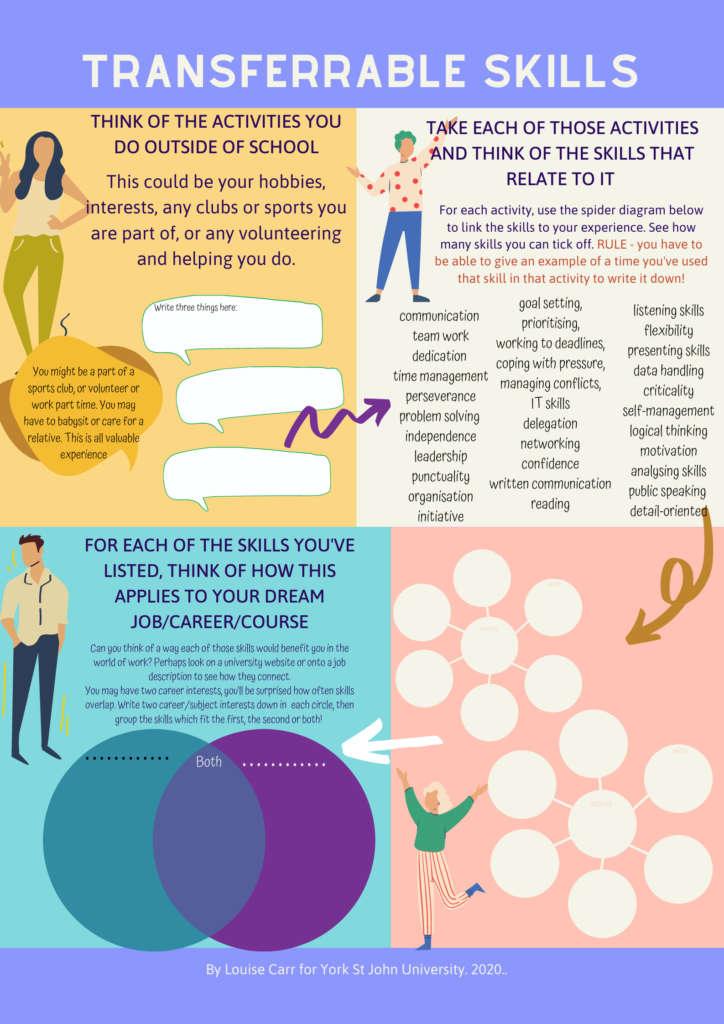Welcome to my section on Transferable Skills. I’m Lou – the Widening Participation Officer at York St John University. I work with students all over Yorkshire and the North East, and sometimes even further, to talk about university, careers and progression.
One question that I sometimes ask in sessions is ‘tell me what skills you have?’ More often than not, this is met with complete silence and students looking around and trying to pluck skills out of thin air.
I believe this is because a lot of students think they don’t possess any skills – and this is not true! Every single person has skills, we develop them every day, by doing our day to day activities.
For example, if you’re in school, chances are you have time management skills because you’ll have to arrive on time, organise getting to different classrooms and lectures, and do homework on time! If you have a hobby or interest, chances are you’re motivated, passionate, and can prioritise your day to allow you some time to devote to your hobby. If you love social media, chances are you have IT skills and an awareness of social media influences and footprints, this could also be seen as networking and communicating.
There’s lots of things we do that involve skills, and they may not seem very exciting to us, but they could be very impressive to someone else.
I can always remember a young lad telling me he had ‘no skills’ all he did was help out in his Uncle’s garage. As someone who can barely fit a lightbulb, I was so impressed with the work he could do and his skills and knowledge. So once we’d identified those skills, we then had to be able to talk about them, and find the right words to make them sound really impressive!
For an easy way to talk about your experience and skills remember A B C!
A – Activity
Tell me about the activity, and don’t be afraid to go into a little bit of detail. For example, you may have had work experience in a shop. But tell me what your roles and responsibilities were, tell me what you actually did. Were you responsible for locking up, or stock checking? Give me examples of how you spent your day.
B – Benefit
Okay, so you’ve had some experience, so what? This is your chance to demonstrate the value of your experiences. Tell me what skills or knowledge you gained from it. Did you develop your reliability or communication skills? Were you able to demonstrate your organisation and time management? This is your chance to drop in those key skill buzz words to impress employers. But go even further, give an example of a time you’ve used that skill. Did you manage conflict during an interaction with an unhappy customer – how did this go? What was the overall outcome? Were you happy with this outcome, or would you have done something differently next time? This is demonstrating your critical reflective thinking which a lot of employers look for!
C- Course or Career.
If you’re applying for college or university or another course, C stands for course. If you’re applying for a job, C stands for career. Use interchangeably to suit your needs.
So, you’ve told me what you’ve done, and what you got out of it. Now you need to tell me how it is relevant, and why the employer should care. You need to demonstrate how those experiences and skills link to the career or subject area you are interested in.
So you’ve had customer service experience – tell me how that applies to your dream job/course. Demonstrate you’ve done your research about what the job involves, drop in a section from the job description. ‘I know part of this role will involve working with customers and complaints…’ Same applies for courses – show you know what you are talking about. ‘I’m particularly interested in the module about… or the work experience opportunity in…’ This highlights to the person reading your application, that you’ve thought it out, you’re clued up on what the course or job involves, and that you’ve put in effort.
There are lots of other CV/Interview structures you can use. There is the STAR technique, the CARR technique (not named after me unfortunately). But for me, ABC is just easier to remember, has fewer steps, and seems to be pretty self explanatory to use.
Have a go and writing a paragraph using the ABC technique – challenge yourself to do it in a tweet and hashtag #ysjoutreach – we’d love to find out what you’ve been up to during lockdown!

Thanks for reading. If you need any help or support, or want to find out more, get in touch wp@yorksj.ac.uk
Lou – Widening Participation Officer

